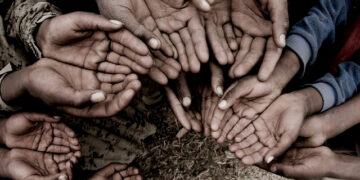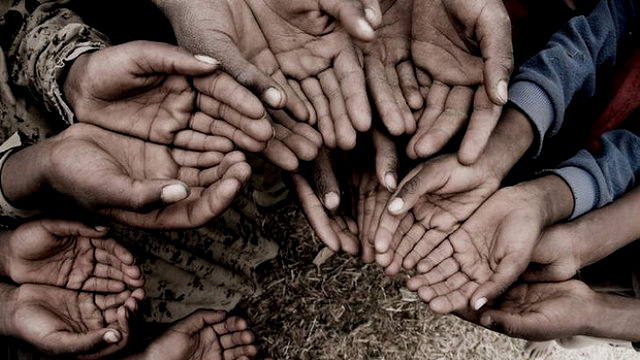HOW can we use poverty and inequality gaps to understand issues of governance and insecurity and evolving social problems in Nigeria? In this piece, I attempt to show why it is important to reduce poverty rate and inequality in Nigeria and the consequences of widening inequality in post-colonial Nigeria.
Since the return to democratic governance in 1999, Nigeria has continued to witness a widening gulf between the minority haves and the majority have-nots. With a population oscillating around 200million and above, Nigeria has not been able to convert her numerical strength to develop the most populous black nation and comfortably locate her among great nations of the world.
Worsening poverty and inequality have reshaped the landscape of governance, social relations and inflicted deadly blow on national security. Recognising its impact on realising the Sustainable Development Goals, Nigeria listed poverty and inequality as national security threats in her 2019 National Security Strategy (NSS, 2019).
The 2019/2020 Nigerian living standards survey released by the National Bureau of Statistics, NBS, shows that 82.9million (40.1 per cent) Nigerians are poor. Disaggregating this data further unveils how poverty has burrowed into the space where most Nigerians domicile – the rural area.
A larger proportion of Nigerians live in rural areas while slightly above 40 per cent live in urban centres. While the national poverty headcount rate is 40.1 per cent, the rural has 52.1 per cent as against urban’s 18.04 per cent headcount rate.
Furthermore, the survey shows that there is a significant geographical inequality in poverty spread. More people are poor in the northern part of Nigeria compared to the southern part. Of these, the northeastern part of the country returned more poverty indices. Adamawa (75.4 per cent), Yobe (72.3 per cent), Sokoto (87.7 per cent), Taraba (87.7 per cent), Zamfara (72.3 per cent), and Jigawa (87.2 per cent) all have percentages of poor people far above national average.
The southern part of the country mostly returned percentages of poor people below the national average while the southwest recorded the lowest number of poor people. Lagos, the commercial nerve centre of the country returned 4.5 per cent, Ogun (9.3 per cent), Ondo (12.5 per cent), and Oyo (9.83 per cent) with Ekiti State (28.4 per cent) returning the highest figure of the poverty endemic state in the region.
Apart from the rural area, women are worst hit by poverty and inequality in post colonial Nigeria and this affect their contribution to national development and role in nurturing pro-social beings for the society. In terms of access and undertaking formal education, men are more privileged than women.
Only about 5.6 per cent are able to undergo post secondary education as against 18.3 per cent of men who have the same opportunity. Education translates to job opportunities available to each gender. For example, Nigeria had 23.1 per cent unemployment rate as at 2018 while underemployment stood at 20.1 per cent.
Of these, males are privileged with 20.3 per cent unemployment rate and 15.4 per cent underemployment rate while females had 26.6 per cent unemployment and 25.9 per cent underemployment. Unemployment and underemployment statistics again favours the urban than those living in the rural area. It explains disparities between male and female and urban and rural dwellers in Nigeria in relation to power, economic opportunities and positionality with the entire Nigerian society. It explains those likely to be exploited and the potential exploiters.
How does age fare in poverty and inequality? Those between the active age (15-34) suffer disproportionately in relation to poverty and inequality than those above this age category. According to the National Bureau of Statistics, 55 percent of active population suffer unemployment and underemployment with about 13.1million unemployed while 11.3million are underemployed. The implication is that those willing and unable to secure gainful employment may deviate and embrace anti social behaviours.
What are the consequences of these statistics on Nigeria? The northern part of the country is disproportionately represented with heavy figures in the poverty dungeon. With poverty, insecurity is birthed and nurtured. Apart from porous border, poverty and widening insecurity, I argue that endemic poverty and entrenched inequalities have created openings for crimes and criminality and other forms of deviant behaviours in northern Nigeria while the entire country bear its cost in relation to growth and development.
The entire north grapples with Bokoharam insurgency, banditry, kidnapping, and pastoralists and herders violence. While other parts of the country have their insecurity challenges such as armed robbery, gang violence, and kidnapping, it is insignificant when compared to the contributions of northern Nigeria to national insecurity. With rising insecurity, there is food insecurity since most of the violence leads to displacements that affect many farming communities.
Governments have also encouraged insecurity to grow. Since the ascendancy of President Muhammadu Buhari to power in 2015, budgetary allocation to education has consistently nosedived to less than seven per cent in 2021 national budget. Majority of States also have terrible allocation to Education. With poor publicly funded education, access is limited for the children of the majority have-nots whose parents receive N30,000 ($77.53) minimum wage per month.
This is partly responsible for the rising out-of-school children. Due to the failure of governments to solve unemployment, poverty, infrastructure (electricity, roads etc), out-of-school children and problem of ungoverned spaces, Nigeria reaps the fruit of leadership negligence through increasing threats to national security. Conversely, more funds are yearly allocated to security without investing in addressing the causes of insecurity.
The widening gap of poverty and inequality in Nigeria explains why it may be a tall dream for the populous Black Country to meet the Sustainable development goals of eradicating unemployment, extreme poverty and hunger. The privileged class holding the levers of power do not see the danger of building an army of unemployed, distressed and disconnected populace who will fight back on the system which has failed to cater for it.
To turn the tide, Nigeria needs to invest in public funded education, close the gap of inequality and actively engage youths in productive economy. Government needs to fix power (electricity) which is central to improving employment and drive industrialisation. Aside the role of the national government, State and local governments must localise development policy to address unmet needs of the poor and the vulnerable in their domains.
Tade, a sociologist and solutions journalism advocate wrote via [email protected]



































